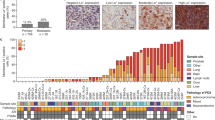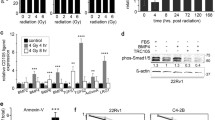Abstract
Preclinical studies show that stroma affects sensitivity of prostate cancer cells via activation of the CXCR4/CXCL12 pathway. Here we studied the effect of CXCR4 inhibition combined with irradiation in prostate cancer cells. In an in vitro co-culture with stromal cells, the CXCR4 inhibitor AMD3100 sensitized prostate cancer cell lines PC3-Luc and LNCaP to irradiation (P = 0.04). Tumor growth and metastasis were evaluated in mice xenografted with luciferase-expressing PC3 cells that received 5 Gy irradiation weekly ± 3.5 mg/kg AMD3100 daily intraperitoneally. The irradiated xenografts showed higher CXCR4 (P = 0.006) and CXCL12 (P = 0.01) expression, compared to controls. AMD3100 sensitized the xenografts to irradiation at the fourth week of treatment (P = 0.02). However AMD3100 also mobilized tumor cells at days 14 and 21 (P < 0.0001), as shown by bioluminescent imaging. In conclusion, AMD3100 transiently enhances prostate cancer radiosensitivity, but induces cancer cell mobilization.





Similar content being viewed by others
Explore related subjects
Discover the latest articles and news from researchers in related subjects, suggested using machine learning.References
Kuonen F, Secondini C, Rüegg C (2012) Molecular Pathways: emerging Pathways Mediating Growth, Invasion, and Metastasis of Tumors Progressing in an Irradiated Microenvironment. Clin Cancer Res 18:5196–5202
Kozin SV, Duda DG, Munn LL et al (2012) Neovascularization After Irradiation: what is the Source of Newly Formed Vessels in Recurring Tumors? J Natl Cancer Inst 104:899–905
Yoshimura M, Itasaka S, Harada H et al (2013) Microenvironment and Radiation Therapy. BioMed Res Int 2013:13
Ponomaryov T, Peled A, Petit I et al (2000) Induction of the chemokine stromal-derived factor-1 following DNA damage improves human stem cell function. J Clin Invest 106:1331–1339
Kioi M, Vogel H, Schultz G et al (2010) Inhibition of vasculogenesis, but not angiogenesis, prevents the recurrence of glioblastoma after irradiation in mice. J Clin Invest 120:694–705
Barcellos-Hoff M, Park C, Wright EG (2005) Radiation and the microenvironment—tumorigenesis and therapy. Nat Rev Cancer 5:867–875
Ou D, Chen C, Lin S et al (2006) Chemokine receptor expression profiles in nasopharyngeal carcinoma and their association with metastasis and radiotherapy. J Pathol 210:363–373
Taichman RS, Cooper C, Keller ET et al (2002) Use of the stromal cell-derived factor-1/CXCR4 pathway in prostate cancer metastasis to bone. Cancer Res 62:1832–1837
Chinni SR, Sivalogan S, Dong Z et al (2006) CXCL12/CXCR4 signaling activates Akt-1 and MMP-9 expression in prostate cancer cells: the role of bone microenvironment-associated CXCL12. Prostate 66:32–48
Domanska UM, Timmer-Bosscha H, Nagengast WB et al (2012) CXCR4 inhibition with AMD3100 sensitizes prostate cancer to docetaxel chemotherapy. Neoplasia 14:709–718
Shiozawa Y, Pedersen EA, Havens AM et al (2011) Human prostate cancer metastases target the hematopoietic stem cell niche to establish footholds in mouse bone marrow. J Clin Invest 121:1298–1312
Porvasnik S, Sakamoto N, Kusmartsev S et al (2009) Effects of CXCR4 antagonist CTCE-9908 on prostate tumor growth. Prostate 69:1460–1469
Petit I, Szyper-Kravitz M, Nagler A et al (2002) G-CSF induces stem cell mobilization by decreasing bone marrow SDF-1 and up-regulating CXCR4. Nat Immunol 3:687–694
Broxmeyer HE, Cooper S, Kohli L et al (2003) Transgenic expression of stromal cell-derived factor-1/CXC chemokine ligand 12 enhances myeloid progenitor cell survival/antiapoptosis in vitro in response to growth factor withdrawal and enhances myelopoiesis in vivo. J Immunol 170:421–429
Lee Y, Gotoh A, Kwon H et al (2002) Enhancement of intracellular signaling associated with hematopoietic progenitor cell survival in response to SDF-1/CXCL12 in synergy with other cytokines. Blood 99:4307–4317
Meads MB, Hazlehurst LA, Dalton WS (2008) The bone marrow microenvironment as a tumor sanctuary and contributor to drug resistance. Clin Cancer Res 14:2519–2526
Meads MB, Gatenby RA, Dalton WS (2009) Environment-mediated drug resistance: a major contributor to minimal residual disease. Nat Rev Cancer 9:665–674
Heidenreich A, Bellmunt J, Bolla M et al (2011) EAU guidelines on prostate cancer. Part 1: screening, diagnosis, and treatment of clinically localised disease. Eur Urol 59:61–71
Mottet N, Bellmunt J, Bolla M et al (2011) EAU guidelines on prostate cancer. Part II: treatment of advanced, relapsing, and castration-resistant prostate cancer. Eur Urol 59:572–583
Klotz L, Zhang L, Lam A et al (2010) Clinical results of long-term follow-up of a large, active surveillance cohort with localized prostate cancer. J Clin Oncol 28:126–131
Singh S, Singh UP, Grizzle WE et al (2004) CXCL12-CXCR4 interactions modulate prostate cancer cell migration, metalloproteinase expression and invasion. Lab Invest 84:1666–1676
Zhuo W, Jia L, Song N et al (2012) The CXCL12-CXCR4 chemokine pathway: a novel axis regulates lymphangiogenesis. Clin Cancer Res 18:5387–5398
De Klerck B, Geboes L, Hatse S et al (2005) Pro-inflammatory properties of stromal cell-derived factor-1 (CXCL12) in collagen-induced arthritis. Arthritis Res Ther 7:1208–1220
Sanchez-Martin L, Estecha A, Samaniego R et al (2011) The chemokine CXCL12 regulates monocyte-macrophage differentiation and RUNX3 expression. Blood 117:88–97
Hatse S, Princen K, Bridger G et al (2002) Chemokine receptor inhibition by AMD3100 is strictly confined to CXCR4. FEBS Lett 527:255–262
Matthys P, Hatse S, Vermeire K et al (2001) AMD3100, a potent and specific antagonist of the stromal cell-derived factor-1 chemokine receptor CXCR4, inhibits autoimmune joint inflammation in IFN-gamma receptor-deficient mice. J Immunol 167:4686–4692
Giubellino A, Woldemichael GM, Sourbier C et al (2012) Characterization of two mouse models of metastatic pheochromocytoma using bioluminescence imaging. Cancer Lett 316:46–52
DiPersio JF, Uy GL, Yasothan U et al (2009) Plerixafor. Nat Rev Drug Discov 8:105–107
Rettig MP, Ansstas G, DiPersio JF (2012) Mobilization of hematopoietic stem and progenitor cells using inhibitors of CXCR4 and VLA-4. Leukemia 26:34–53
Galsky MD, Vogelzang NJ, Conkling P et al (2014) A phase I trial of LY2510924, a CXCR4 peptide antagonist, in patients with advanced cancer. Clin Cancer Res 20:3581–3588
Muller A, Homey B, Soto H et al (2001) Involvement of chemokine receptors in breast cancer metastasis. Nature 410:50–56
Smith MC, Luker KE, Garbow JR et al (2004) CXCR4 regulates growth of both primary and metastatic breast cancer. Cancer Res 64:8604–8612
Huang EH, Singh B, Cristofanilli M et al (2009) A CXCR4 antagonist CTCE-9908 inhibits primary tumor growth and metastasis of breast cancer. J Surg Res 155:231–236
Uchida D, Onoue T, Kuribayashi N et al (2011) Blockade of CXCR4 in oral squamous cell carcinoma inhibits lymph node metastases. Eur J Cancer 47:452–459
Wong D, Kandagatla P, Korz W et al (2014) Targeting CXCR4 with CTCE-9908 inhibits prostate tumor metastasis. BMC Urol 14:12
Nervi B, Ramirez P, Rettig MP et al (2009) Chemosensitization of acute myeloid leukemia (AML) following mobilization by the CXCR4 antagonist AMD3100. Blood 113:6206–6214
Dillmann F, Veldwijk MR, Laufs S et al (2009) Plerixafor inhibits chemotaxis toward SDF-1 and CXCR4-mediated stroma contact in a dose-dependent manner resulting in increased susceptibility of BCR-ABL + cell to Imatinib and Nilotinib. Leuk Lymphoma 50:1676–1686
Hassan S, Buchanan M, Jahan K et al (2010) CXCR4 peptide antagonist inhibits primary breast tumor growth, metastasis and enhances the efficacy of anti-VEGF treatment or docetaxel in a transgenic mouse model. Int J Cancer 129:225–232
Weekes CD, Song D, Arcaroli J et al (2012) Stromal cell-derived factor 1 mediates resistance to mTOR-directed therapy in pancreatic Cancer. Neoplasia 14:690–701
Schmid MC, Avraamides CJ, Foubert P et al (2011) Combined blockade of integrin-α4β1 plus cytokines SDF-1α or IL-1β potently inhibits tumor inflammation and growth. Cancer Res 71:6965–6975
Kozin SV, Kamoun WS, Huang Y et al (2010) Recruitment of myeloid but not endothelial precursor cells facilitates tumor regrowth after local irradiation. Cancer Res 70:5679–5685
Coussens LM, Zitvogel L, Palucka AK (2013) Neutralizing tumor-promoting chronic inflammation: a magic bullet? Science 339:286–291
Kalatskaya I, Berchiche YA, Gravel S et al (2009) AMD3100 is a CXCR7 ligand with allosteric agonist properties. Mol Pharmacol 75:1240–1247
McGinn OJ, Marinov G, Sawan S et al (2012) CXCL12 receptor preference, signal transduction, biological response and the expression of 5T4 oncofoetal glycoprotein. J Cell Sci 125:5467–5478
Acknowledgments
We thank Karin Tamas, Roeliene C. Kruizinga and Coby Meijer for inspiring comments and discussions and Malgorzata Krajewska for her support with FACS analysis of DNA damage. This study was supported by the Dutch Cancer Society (grant number RUG 2010-4622).
Conflict of interest
All authors declare that they have no conflict of interest.
Author information
Authors and Affiliations
Corresponding author
Electronic supplementary material
Below is the link to the electronic supplementary material.
Rights and permissions
About this article
Cite this article
Domanska, U.M., Boer, J.C., Timmer-Bosscha, H. et al. CXCR4 inhibition enhances radiosensitivity, while inducing cancer cell mobilization in a prostate cancer mouse model. Clin Exp Metastasis 31, 829–839 (2014). https://doi.org/10.1007/s10585-014-9673-2
Received:
Accepted:
Published:
Issue Date:
DOI: https://doi.org/10.1007/s10585-014-9673-2




